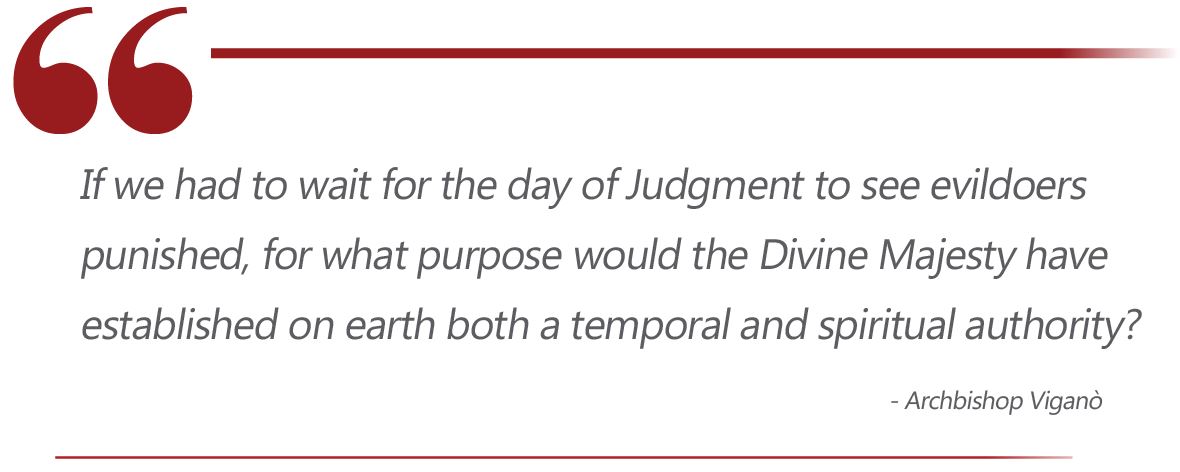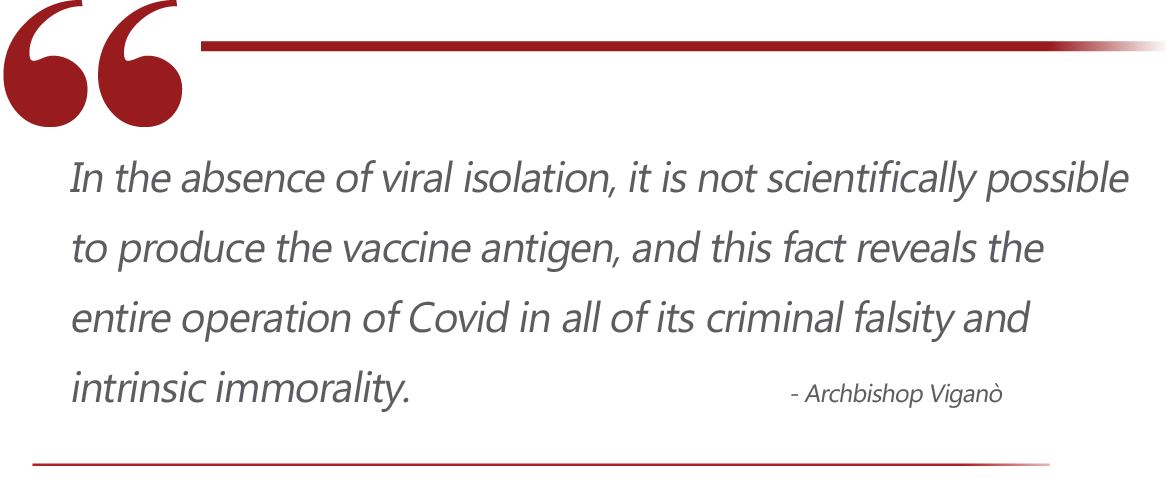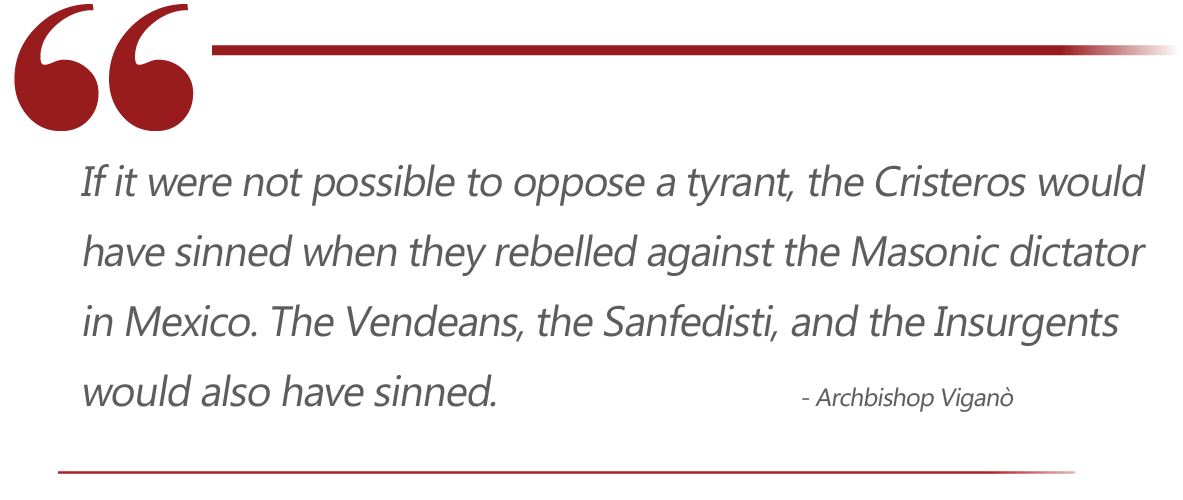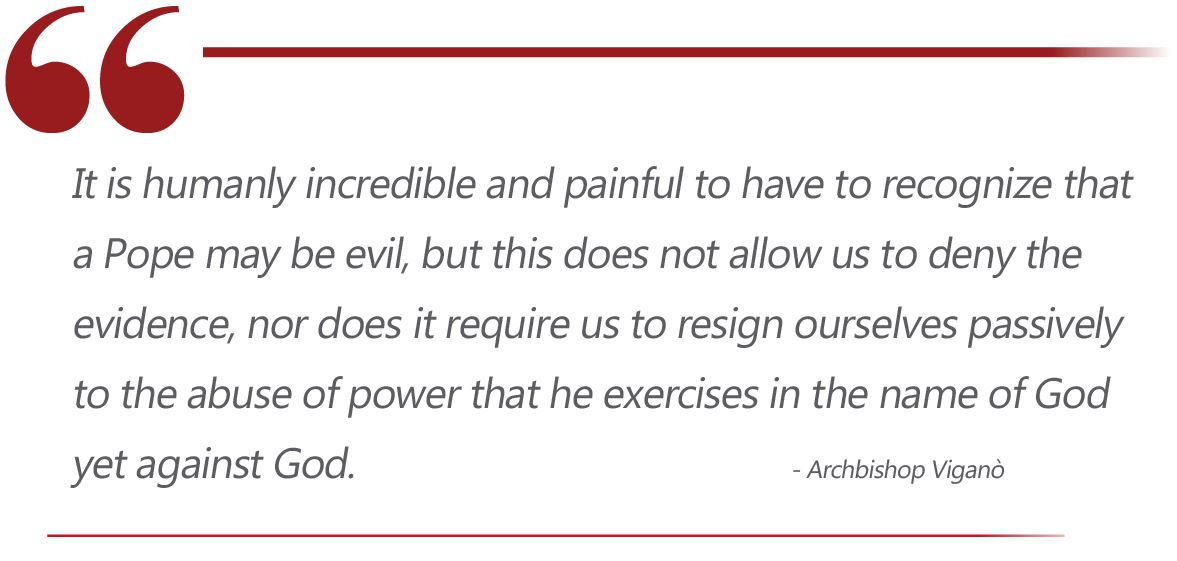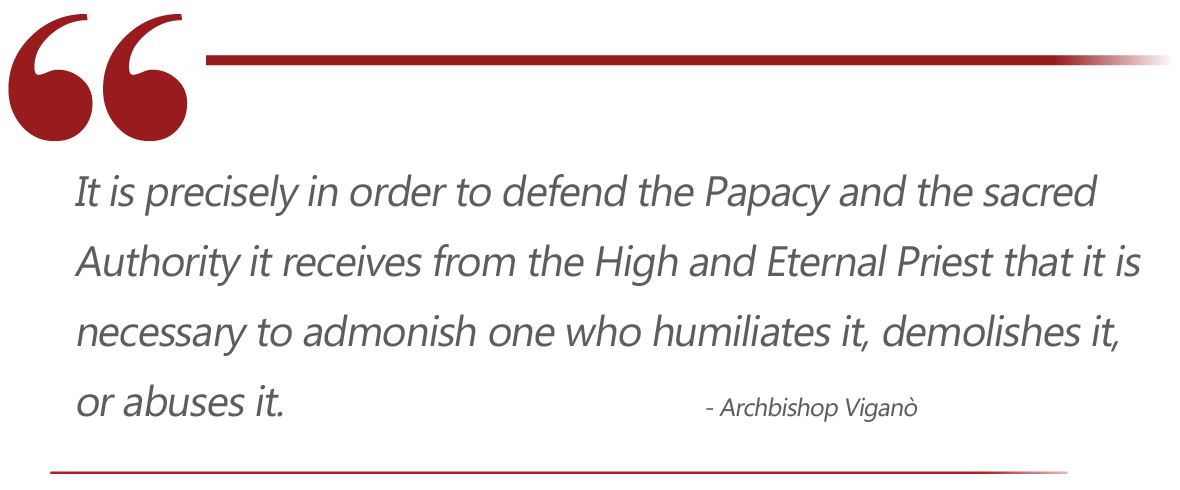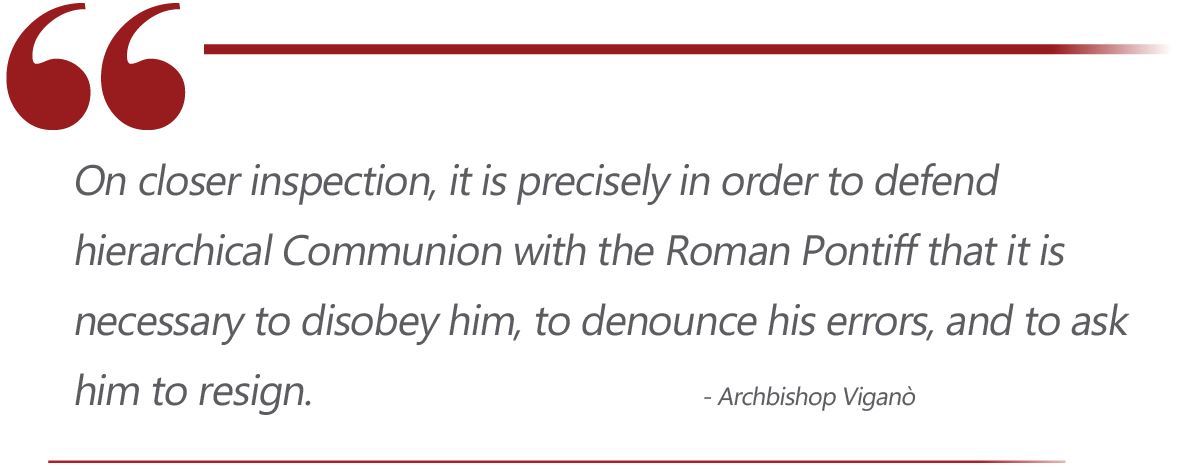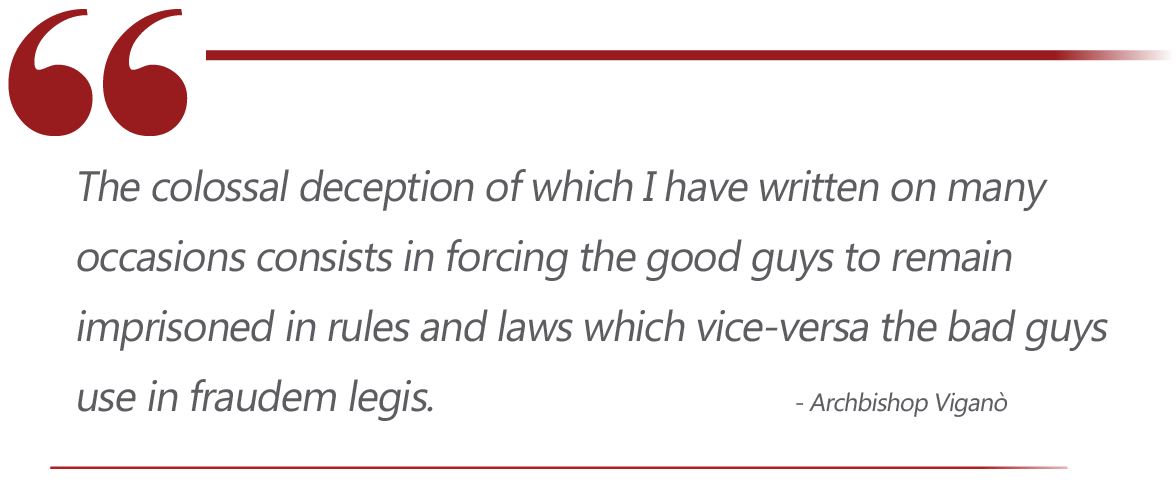The problem of a perverted authority – that is, one that does not act within its proper limits or which has autonomously given to itself a purpose opposite to that which legitimizes it – is addressed by Sacred Scripture, reminding us that omnis potestas a Deo [all power comes from God] (Rom 13:1) and that qui resistit potestati, Dei ordinationi resistit [whoever resists authority, resists what God has ordained] (Rom 13: 2). And if Saint Paul tells us to obey civil authority, all the more are we bound to obey ecclesiastical authority, due to the primacy that spiritual matters have over temporal ones.
You observe that it is not up to us to judge authority, because the Son of Man will return to do justice at the end of time. But if we had to wait for the day of Judgment to see evildoers punished, for what purpose would the Divine Majesty have established on earth both a temporal and spiritual authority? Is it not perhaps their task, as Vicars of Christ the King and High Priest, to reign and govern their subjects on this earth, administering justice and punishing evildoers? What sense would laws have if there were not those whose task it is to make them be respected, sanctioning those who violate them? If the arbitrariness of those who are established in authority were not punished by those who have authority over them, how could their subjects – both civil and ecclesiastical – hope to obtain justice on earth?
I fear that your objection, according to which Ecclesiastics whose power derives from the authority of the office which they hold can be judged only at the end of time, may lead on the one hand to fatalism and resignation on the part of the subjects, and on the other hand it may constitute a sort of encouragement to Superiors to abuse their power.
Obedience to a perverted authority cannot be considered to be required, nor morally good, simply because when the Son of Man returns at the end of time He will do justice. Scripture urges us to be obedient, moderating our obedience with patience and a spirit of penance, but it does not exhort us absolutely to obey orders that are intrinsically evil simply because the one who issues the orders to us holds authority. Such authority, in fact, precisely at the moment in which it is exercised against the purpose for which it exists, deprives itself of the legitimacy that justifies it and, even when it does not lapse in itself, it nevertheless requires from its subjects an acceptance that ought to be evaluated and judged from time to time.
With the Revolution, the Ordo Christianus, which recognized established Authority as coming from God, was overthrown in order to make way for the so-called democracies in the name of the secularization of the State and its separation from the Church. With the Second Vatican Council, this subversion of the principle of authority insinuated itself into the hierarchy itself, causing the order willed by God not only to be cancelled in civil society but also to be threatened within the Church. Obviously, when the work of God is tampered with and His Authority is denied, power is irremediably compromised and the conditions are created for tyranny or anarchy.
Nor is the Church an exception, as we can painfully observe: power is often exercised to punish the good and reward evildoers; canonical sanctions almost always serve to excommunicate those who remain faithful to the Gospel; the Dicasteries and organs of the Holy See support error and impede the propagation of the Truth. Bergoglio himself, who ought to represent the highest Authority on earth, uses the power of the Holy Keys to support the globalist agenda and promote heterodox doctrines, well aware that the principle of Prima Sedes a nemine iudicatur permits him to proceed undisturbed.
This situation is obviously anomalous, because in the order established by God the one who represents authority is owed obedience. But into this wonderful kosmos, Satan insinuates chaos, tampering with its fragile and sinful element: namely, man. You highlight this well in your letter, dear Priest:
Now, the most diabolical thing that our enemy has succeeded in doing is to use precisely those who present themselves to the world invested with the authority conferred by Jesus Christ on His Church in order to do evil, with this effect: on the one hand involving some of the good in evil, but on the other hand scandalizing the good who are aware of it.”
And you then contextualize this situation in the present case:
The authority of Jesus has been used abusively to justify and support a terrible operation, which is being presented under the false name of vaccination.”
I agree with you about the assessments of the objective immorality of the so-called vaccine against Covid-19, due to the use of material derived from aborted fetuses. I likewise agree with the absolute inadequacy – scientific, as well as philosophical and doctrinal – of the document promulgated by the CDF, whose Prefect merely supinely executes more-than-questionable orders imparted from on high: the obedience of these reprobates is emblematic, in these situations, because it knows how to casually ignore the authority of God and the Church in the name of a courtly subservience to the authoritarianism of the immediate superior.
Nevertheless, I would like to specify that the document of the Holy See is particularly insidious not only for having analyzed only a remote aspect, so to speak, of the composition of the drug (prescinding from the moral liceity of an action that does not lose its gravity with the passing of time), but also for having deliberately ignored that in order to “refresh” the original fetal material it is necessary to periodically add new fetuses, obtained from ad hoc induced third-month abortions, and that the tissues must be taken from creatures that are still alive, with a beating heart.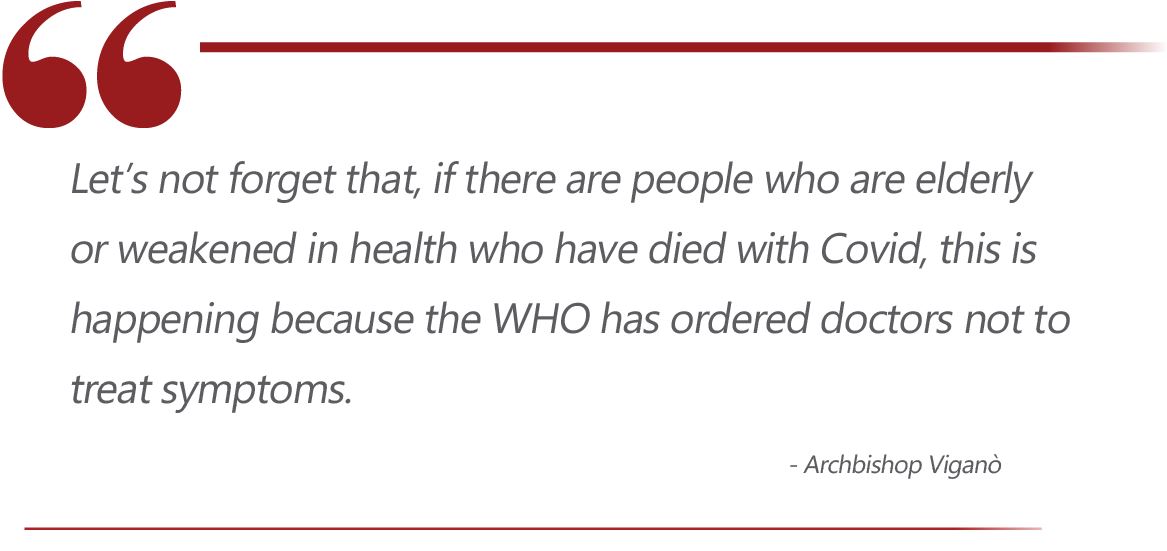
Given the importance of the matter and the denunciation of the Catholic scientific community, the omission of an integral element for the production of the vaccine in an official pronouncement confirms, in the most generous hypothesis, a scandalous incompetence, and in the most realistic analysis reveals the deliberate desire to pass off vaccines produced by means of induced abortions as morally acceptable. This sort of human sacrifice, in its most abject and bloody form, is therefore considered negligible by a Dicastery of the Holy See in the name of the new health religion, of which Bergoglio is a staunch supporter.
I agree with you on the omission of the evaluations concerning the genetic manipulation induced by certain vaccines that act at the cellular level, with purposes that the pharmaceutical companies do not dare to confess, but which the scientific community has amply denounced and whose long-term consequences are still not known. But the CDF scrupulously avoids expressing itself even on the morality of experimentation on humans, admitted by the vaccine manufacturers themselves, who reserve the right to provide data on this mass experimentation only a few years from now, when it will be possible to understand whether the drug is effective and at the price of what permanent side-effects.
In the same way, the CDF is silent on the morality of shamefully speculating on a product that is being presented as the only defense against an influenza virus that still has not been isolated but only sequenced. In the absence of viral isolation, it is not scientifically possible to produce the vaccine antigen, and this fact reveals the entire operation of Covid – to anyone who is not blinded by prejudice or bad faith – in all of its criminal falsity and intrinsic immorality.
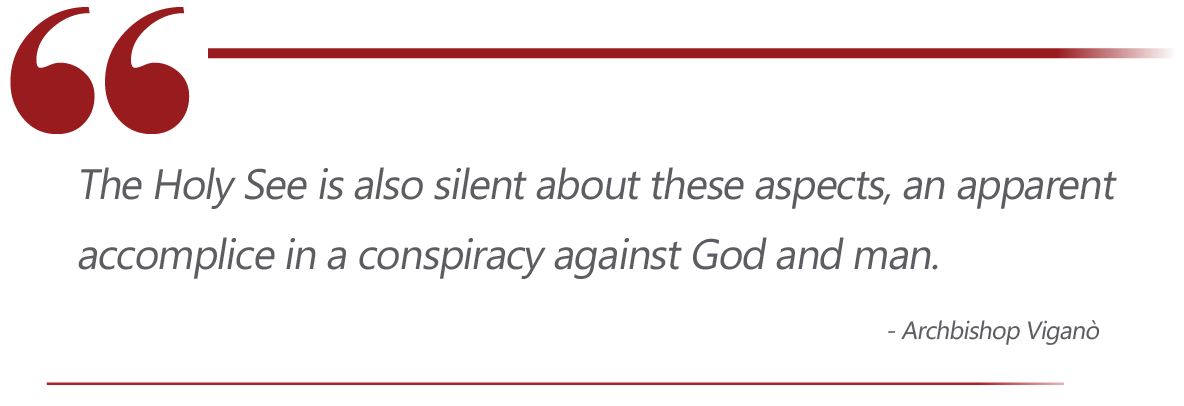
Let’s return now to the question of authority. You write:
Therefore whoever finds himself facing people invested with the Authority of Jesus who are acting in a way that is obviously opposed to His mandate, finds himself in the condition of having to ask himself whether or not he can obey their Authority, when in terrible situations like this, whoever exercises authority in the name of Jesus is blatantly going against His Mandates.”
The answer comes to us from Catholic doctrine, which places very clear limits on the authority of Prelates and on the supreme authority of the Pope. In this case it seems evident to me that it is not the competence of the Holy See to express assessments which, due to the way in which they are presented and analyzed and also due to the obvious omissions they contain, cannot fall even minimally within the scope of matters that may be legitimately determined by the Magisterium. The problem, on closer inspection, is logical and philosophical, even before it is theological or moral, because the terms of the quaestio are incomplete and erroneous, and the response too is erroneous and incomplete.
This does not take anything away from the gravity of the CDF’s behavior, but at the same time it is precisely in overstepping the proper limits of ecclesiastical authority that the general principle of doctrine is confirmed, and with it also the infallibility which the Lord guarantees to His Vicar when he intends to teach a truth related to Faith or Morals as the Supreme Pastor of the Church. If there is not a truth to teach; if this truth has nothing to do with Faith or Morals; if the one who promulgates this teaching does not intend to do so with Apostolic Authority; if the intention to transmit this doctrine to the faithful as truth to be held and believed is not explicit, the assistance of the Paraclete is not guaranteed, and the authority which promulgates it may be – and in certain cases must be – ignored. It is thus possible for the faithful to resist the illegitimate exercise of a legitimate authority, the exercise of an illegitimate authority, or the illegitimate exercise of an illegitimate authority.
Therefore I do not agree with you when you affirm:
If infidelity affects this authority, only God can intervene. Also because even with regard to lower levels of authority it becomes difficult to have recourse to them and hope to have justice.”
The Lord can intervene positively in the course of events, manifesting His will in a prodigious way of even just shortening the evildoers’ days. But the infidelity of one who is constituted in authority, although it is not able to be judged by his subjects, is not for this reason any less culpable, nor can obedience be demanded to illegitimate or immoral orders. The effect which this infidelity has on his subjects is one thing, while the judgment about this way of acting is another thing, and still another is the punishment that it may merit. Thus, if it is not up to the subjects to put the Pope to death for heresy (despite the death penalty being considered by Saint Thomas Aquinas as commensurate to the crime of one who corrupts the Faith), we can nevertheless recognize a Pope as a heretic, and as such refuse, on a case-by-case basis, to show him the obedience to which he would otherwise be entitled. We do not judge him, because we do not have the authority to do so, but we recognize him for who he is, waiting for Providence to arouse those who can pronounce it definitively and authoritatively.
This is why, when you state that “it is not the subordinates of those evildoers who have the authority to rebel and overthrow them from their post,” it is necessary first of all to distinguish what type of authority is in question, and in the second place what order is being given and what damage would be caused by the proposed obedience. Saint Thomas considers resistance to the tyrant and regicide as morally licit in certain cases, just as it is licit and dutiful to disobey the authority of Prelates who abuse their own power against the intrinsic purpose of that power itself.
In your letter, you identify the mark of communist ideology in the rebellion against authority. But the Revolution, of which Communism is one expression, intends to overthrow sovereigns not because they may be corrupt or tyrannical, but because they are hierarchically inserted in a cosmos that is essentially Catholic, and thus antithetical to Marxism.
If it were not possible to oppose a tyrant, the Cristeros would have sinned when they rebelled with weapons against the Masonic dictator in Mexico who persecuted its citizens, abusing his proper authority. The Vendeans, the Sanfedisti, and the Insurgents would also have sinned: victims of a revolutionary, perverted and perverting power, before which rebellion was not only licit but also necessary. Those Catholics who, in the course of history, had to rebel against their Prelates were also the victims of such power: for example, the faithful in England who had to resist their Bishops who had become heretics with the Anglican schism, or those in Germany who were forced to refuse obedience to the Prelates who had embraced the Lutheran heresy. The authority of these Shepherds who had become wolves was in fact null, because it was oriented towards the destruction of the faith rather than its defense, against the Papacy rather than in communion with it. You rightly add: “Then the poor faithful, in the face of their pastors who commit such crimes, and in such a shameless way, are stunned. How can I follow in the name of Jesus someone who instead does what Jesus does not want?”
And yet a little further on I read these words of yours:
Whoever denies their authority in reality denies the Authority of He who has established them. And whoever wants to deny the Authority of Him who established them must also deny their authority. Whoever instead remains subject to the authority of the ministers established in authority by Jesus, while not making themselves complicit in their errors, obeys the Authority of Jesus, who has established them.”
This proposition is clearly erroneous, since by indissolubly connecting the first and original authority of God to the derived and vicarious authority of the person, it infers a sort of indefectible bond, a bond which instead disappears the moment when the one who exercises the authority in the name of God in fact perverts it and upsets its purpose by subverting it. I would say that it is precisely because the authority of God must be held in the highest honor that it cannot be disregarded by obeying one who is by his nature subject to the same divine authority. For this reason, Saint Peter (Acts 5:29) exhorts us to obey God rather than men: earthly authority, whether temporal or spiritual, is always subject to the authority of God. It is not possible to think that – for a reason that seems almost dictated by a bureaucrat – the Lord wanted to leave His Church at the mercy of tyrants, almost preferring their procedurally legal legitimacy to the purpose for which He has placed them to shepherd His flock.
Of course, the solution of disobedience appears more easily applicable to Prelates than to the Pope, since Prelates may be judged and deposed by the Pope, while the latter cannot be deposed by anyone on earth. But if it is humanly incredible and painful to have to recognize that a Pope may be evil, this does not allow us to deny the evidence, nor does it require us to resign ourselves passively to the abuse of power that he exercises in the name of God yet against God. And if no one will want to assault the Sacred Palace in order to drive out the unworthy guest, legitimate and proportionate forms of real opposition can be exercised, including pressure to resign and abandon the office. It is precisely in order to defend the Papacy and the sacred Authority it receives from the High and Eternal Priest that it is necessary to admonish one who humiliates it, demolishes it, or abuses it. I would even dare to say, for the sake of completeness, that also the apparently arbitrary renunciation of the exercise of the sacred authority of the Roman Pontiff represents a very grave vulnus to the Papacy, and for this we must consider Benedict XVI responsible more than Bergoglio.
__________
EDITOR'S NOTE: Dear Friends, social media is cracking down on Conservative content. Many of you have complained that you stopped seeing our content in your news feeds. We hear you, and we have a way of staying connected in the fight — subscribe to my FREE weekly eblast. Click here. - MJM
___________
You then mention what the tyrannical Prelate would think of his own authority: “[such] a minister of God [...] should first of all deny his authority as an apostle, or one sent by Jesus. He should recognize that he does not want to follow Jesus and go away. In such a way the problem will be resolved.” But, dear Priest, you expect that the iniquitous man will act as an honest and God-fearing person, while it is precisely because he is wicked that he will abuse without any consistency or scruple a power which he knows well that he has maliciously conquered in order to demolish it. Since it pertains to the very essence of tyranny, as a perversion of just and good authority, not only to exercise authority in a perverse way but also to want to throw discredit and repulsion on that authority of which it is a grotesque counterfeit. The horrors committed by Bergoglio in recent years not only represent an indecorous abuse of papal authority, but they have as an immediate consequence the scandal given to good people in his regard, because, by means of a parody of the Papacy, he renders the Papacy itself hateful and odious, irreparably compromising the image and prestige which the Church has enjoyed up until now, even though she has been afflicted by modernist ideology for decades.
You write:
Therefore, it is not licit for anyone to obey unjust or evil, illegitimate orders, or to do anything evil with the pretext of obedience. But nor is it permitted to anyone to deny the authority of the Pope because he exercises it in an evil way, thereby going out of the Church established by Jesus on the rock of the Apostle Peter.”
Here the expression “to deny the authority” must be distinguished between denying that Bergoglio has an authority as Pope and, vice-versa, denying that Bergoglio, in this specific order that he gives to the faithful, has the right to be obeyed when the order is in conflict with the authority of the Pope. Nobody would obey Bergoglio if he spoke in a personal capacity or were an employee of the land registry office, but the fact that as Pope he teaches heterodox doctrines or gives scandal to the simple with provocative affirmations makes his fault one of extreme gravity, because whoever listens to him believes that he is listening to the voice of the Good Shepherd. The moral responsibility of the one who commands is immeasurably greater than that of the subject who has to decide whether to obey him or not. The Lord will inflexibly ask for an accounting of this, for the consequences that the good or evil done by the superior has on his subordinates, also in terms of good or bad example.
On closer inspection, it is precisely in order to defend hierarchical Communion with the Roman Pontiff that it is necessary to disobey him, to denounce his errors, and to ask him to resign. And to pray that God calls him to Himself as soon as possible, if a good for the Church can derive from this.
The deception, the colossal deception of which I have written on many occasions, consists in forcing the good guys – let’s call them this for the sake of brevity – to remain imprisoned in rules and laws which vice-versa the bad guys use in fraudem legis. It is as if they understood our weakness: that is, that we, despite all our defects, are religiously and socially directed towards respect for the law, to obedience to authority, to honoring our word, and to acting with honor and loyalty. By means of this virtuous weakness of ours, they guarantee from us obedience and submission, and, at the most, respectful resistance and prudent disobedience.
This Open Letter will appear in the February 15th Remnant Newspaper. Want to read the rest?
Subscribe today!
They know that we – poor fools, they think – see in them the authority of Christ, and that we try to obey this authority, even if we know that that such an act of obedience, even if morally irrelevant, goes in a very specific direction.... This is how they imposed the reformed Mass on us; this is how they have accustomed us to hearing surahs of the Koran sung from the ambos of our cathedrals and seeing them transformed into restaurants or dormitories; this is how they want to present the admission of women to the service of the altar as something normal.... Every step taken by Authority, from the Council onwards, was possible because we obeyed the Sacred Pastors, and even though certain decisions that they made seemed deviant to us, we could not believe that they were deceiving us; and perhaps they themselves, in turn, did not realize that the orders that were given had an iniquitous purpose.
Today, following the common thread that unites the abolition of Minor Orders to the inventions of acolytesses and deaconesses, we understand that those who reformed Holy Week under Pius XII already had the Novus Ordo and its atrocious contemporary forms in mind. The embrace of Paul VI with Patriarch Athenagoras aroused in us hopes of true ecumène, because we had not understood – as some had instead denounced – that this gesture would pave the way to the pantheon of Assisi, the obscene idol of the pachamama and, shortly afterwards, the sabbath of Astana.
None of us wants to understand that this impasse can be broken simply by not humoring it: we must refuse to engage in a duel with an adversary who dictates the rules to which only we must comply, while leaving himself free to break them. Ignore him. Our obedience has nothing to do with either fearful servility or with insubordination; on the contrary, it permits us to suspend any judgment on who is or is not Pope, continuing to conduct ourselves as good Catholics even if the Pope derides us, despises us, or excommunicates us: because the paradox does not lie in the disobedience of the good against the authority of the Pope, but rather in the absurdity of having to disobey a person who is simultaneously Pope and heresiarch, Athanasius and Arius, one who is de iure light but de facto darkness.
The paradox is that in order to remain in Communion with the Apostolic See we must separate ourselves from the one who should represent it, and see ourselves bureaucratically excommunicated by one who is an objective state of schism with himself. The evangelical precept of “Do not judge” must not be understood in the sense of abstaining from the formulation of a moral judgment but rather from the condemnation of the person, otherwise we would be incapable of defining moral actions. Of course, it is not up to the individual to separate the wheat from the weeds, but no one ought to say that the wheat is weeds nor that the weeds are wheat. And those who are invested with Holy Orders, and even more so those who have the fullness of the Priesthood, have not only the right but also the duty to point out those who sow weeds, the rapacious wolves and false prophets. For in this case too there is, along with participation in the Priesthood of Christ, also participation in His royal Authority.
What we do not realize, both in the political and social sphere as well as in the ecclesiastical sphere, is that our initial acceptance of a presumed right of our adversary to do evil, based on an erroneous conception of freedom (moral, doctrinal, and religious), is now mutating into a forced tolerance of the good while sin and vice have become the norm. That which yesterday was admitted as our gesture of indulgence today claims full legitimacy, and it confines us to the margins of society as a minority on the way to extinction.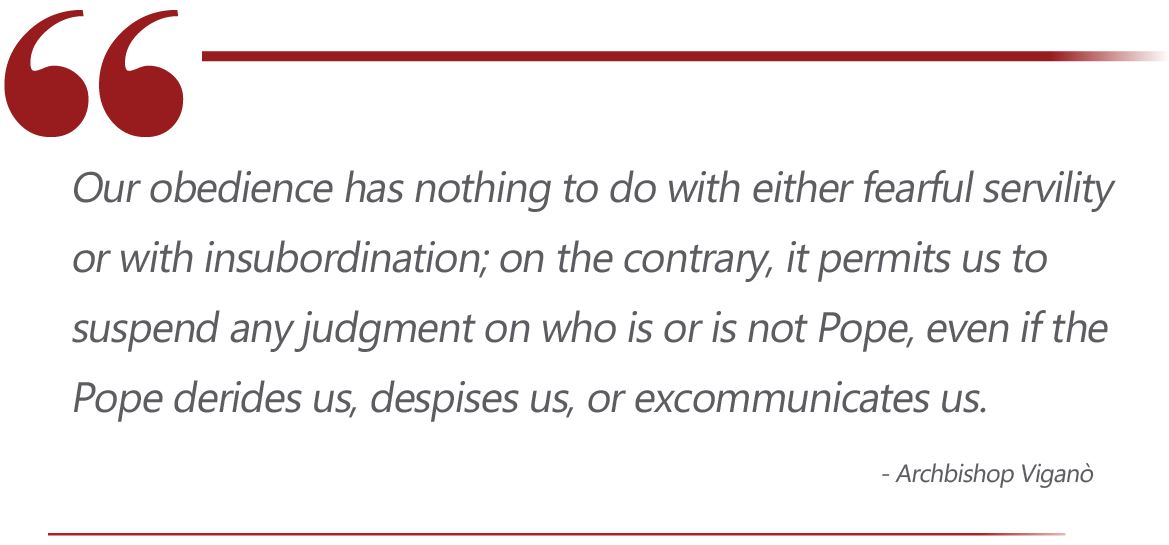
Soon, consistent with the antichristic ideology that oversees this inexorable mutation of values and principles, virtue will be prohibited and those who practice it will be condemned, in the name of an intolerance towards the Good that is identified as divisive, fundamentalist, and fanatic. Our tolerance towards those who, today, promote the demands of the New World Order and its assimilation into the ecclesial body will infallibly lead to the establishment of the kingdom of the Antichrist, in which the Catholic faithful will be persecuted as public enemies, similarly as in Christian times heretics were considered public enemies. In short, the enemy has copied the system of societal protection implemented by the Church in Catholic nations, overturning and perverting it.
I believe, dear Father, that your observations about the crisis of authority will soon be further confirmed, at least judging from the speed with which Bergoglio and his court deal their blows against the Church. For my part, I pray that the Lord may bring to light the truth that has been hidden until now, allowing us to recognize the Vicar of Christ on earth not so much be the garments he wears as by the words that come forth from his mouth and by the example of his works.
Receive my Blessing, as with confidence I entrust myself to your prayer.
+ Carlo Maria, Archbishop
31 January 2021
Dominica in Septuagesima
Official Translation




